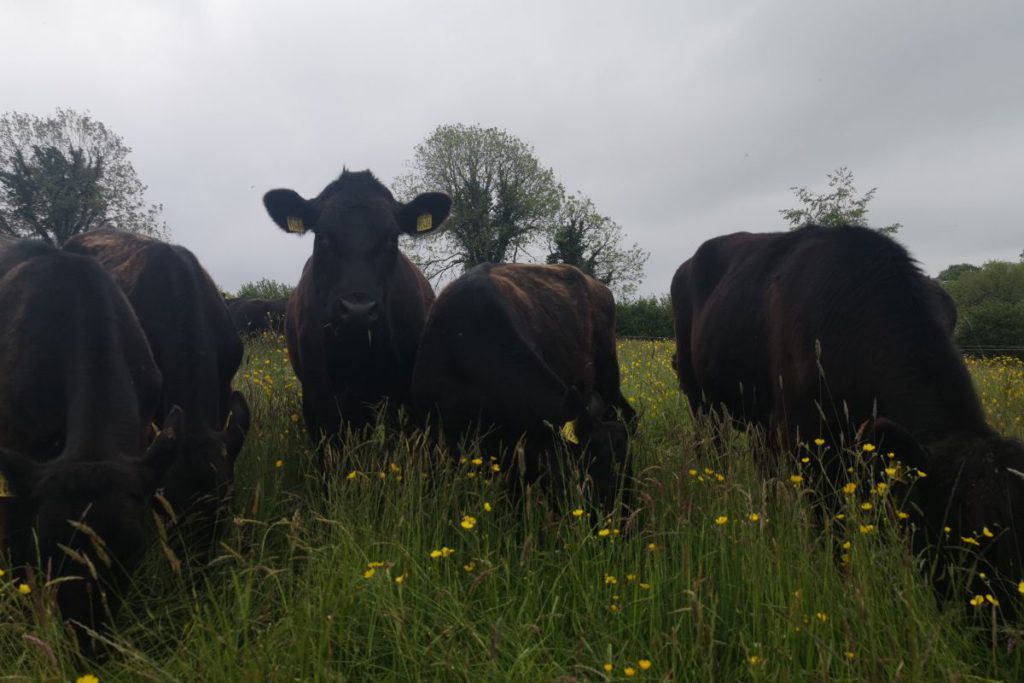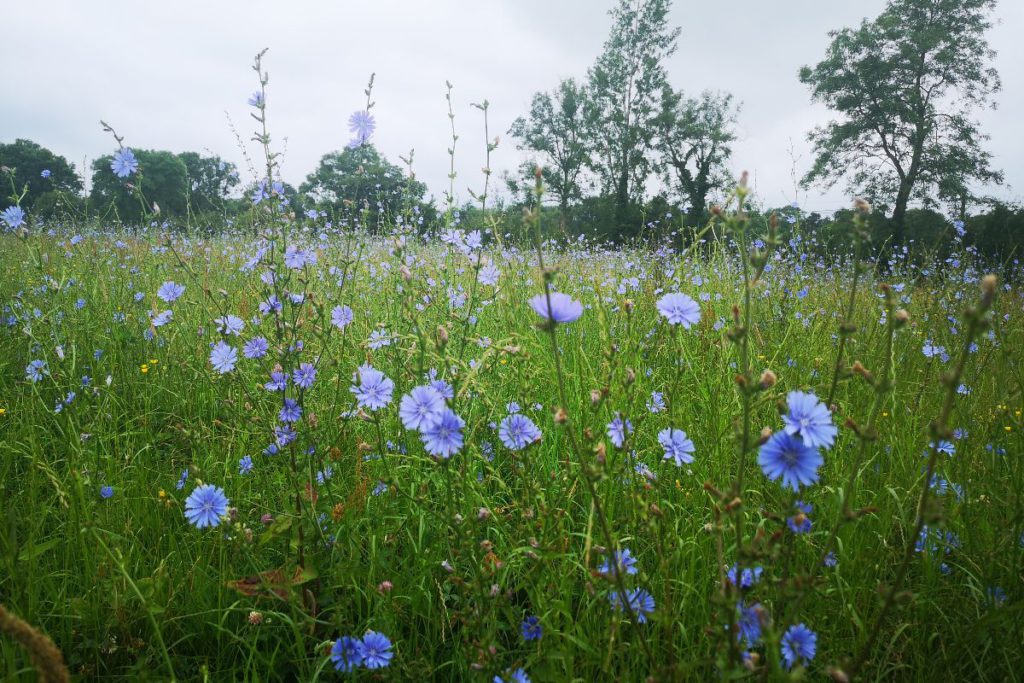In this week’s Farmer Focus segment, That’s Farming, speaks to the O’Briens of the organically-certified Cúlbhac Farm. They discuss becoming full-time farmers, farming without chemicals and specialising in fresh, high-quality produce.
Esther and Ollie O’Brien, a married couple with three children in Newport, Co Tipperary, have accomplished their primary goal: for them both to become full-time farmers.
They run Cúlbhac Farm, a 100-acre chemical-free, organically-certified operation that has been in the O’Brien family for over two centuries.
They specialise in producing fresh, high-quality produce to their local community.
Ollie’s entrepreneurial father operated additional businesses on-farm, such as Christmas trees and cycle tours. In the 1980s, the farm was home to a dairy herd, which was struck down with TB.
His father exited dairy and entered beef and organics with the Irish Organic Association, and operated a small bus company that Ollie and his brothers worked in at some point.
Ollie met a New Zealand girl, Esther, overseas in New York and brought her to the Emerald Isle. She also has a farming background, growing up on a 3,000-acre high country sheep and beef station in the North Island mountain ranges.
She told That’s Farming: “I escaped to the cities after university, to get far away from farming life.”
“Ollie did not look at all like a farmer to me, which was promising,” she laughed.
“Nearly ten years ago, Ollie’s parents asked him if he was interested in the farm and possibly a partnership. But Ollie learnt to farm quickly when his father passed away, also working full-time off the farm and with newborn twin girls.”
Cúlbhac Farm
The couple had been thinking of business ideas for the farm for a few years. The dream was for both to work on the farm full-time.
They were interested in promoting biodiversity, looking after the environment, and adding to the farm, such as planting trees, maintaining hedgerows.
Having small children, rearing calves and having laying hens seemed appealing as Esther was able to start the business, while Ollie worked off the farm for a longer period. They discovered a mobile hen house system and decided to “jump in”, ordering 300 hens to begin with.
Ollie had time to build the house, which he did so out of an old army trailer. The challenge was to meet organic housing standards, and “after a bit of head-scratching and ingenuity, we got there,” they explained.
“Since then, Ollie has taught himself to weld and has built two more hen houses and a mobile dairy milker too, preferably re-using materials.”
“The first Covid lockdown had happened, and we had 300 eggs a day to sell. We rebranded the farm to Cúlbhac Farm, which was its original name but was anglosied in 1840 to the township of Oakhampton.”

Honesty boxes and social media
In New Zealand, farm honesty boxes are used to sell farm produce, usually for fruit and vegetables. The O’Briens put one up at the farm gate, and today, it continues to act as its best route to market.
Social media was a game-changing tool when the pandemic forced markets and food businesses to close, as their primary aim is to sell directly to customers.
“Building and registering an egg packery on the farm opened doors to selling in retail and restaurants. Now, we have expanded 700 birds and are now both full-time on the farm.”
“We have been in the organic egg business 14 months. We were always going to start our business at this time. The lockdown forced us to think out of the box, and we did well.”
“It helped that people were at home and could come to visit our farm or our small collection in the villages,” she added.

Certified organic beef
They have also diversified into organic beef production and are building a herd of organic Angus cattle to sell organic beef directly to customers. In addition, they rear approximately 40 calves annually from Templeroe Farm, raw milk producers in Crecora.
“We have started to milk some of these Angus cows with a mobile milker that Ollie welded together. He milks them out in the fields and moves the milker with the tractor. It is a 2-berth and runs on a generator. We use this milk to feed calves.”
“Also, we have started mob grazing the Angus beef herd with around a 90-day rotation. We may slightly shorten this next year as we’ve had too much grass this year. A road separates the farm in half, and we no longer regularly have to cross the road with them. Now, they only graze one side of the farm, while the hens and milking calves are not the other side.”
“In one season, we have seen new grasses and flowers in the pastures; we will let them re-seed themselves. Our organic beef goes to Good Herdsman, and we hope to sell more directly to our local market very soon.”

Vegetables
Furthermore, they sell organic salad, George’s Green, in the spring and summer, which they grow in their polytunnels. Besides, they also grow their own vegetables and hope to have surplus supplies to sell next year.
They have planted black currents, cobnuts and plan to plant more every year with fruit trees and other hardwoods in an agroforestry system.
The Tipperary farmers do not cut hedgerows but will only undertake maintenance if hedgerow plants are being crowded out by hardwoods.
Their hedgerows are “heaving at the moment” with hawthorn berries, sloe, ivy flowers, blackberries, dog rose hips, crab apples, and “there is still honeysuckle about”.

Bee-keeping and other enterprises
Besides, they have also become beekeepers and have two hives. This year, the O’Briens have enough honey for their household, but they hope to expand and sell honey locally too soon.
“Moreover, we have only started delving into new enterprises the past year. We hope to build the farm so that it creates employment opportunities for local people and supplies people with fresh local produce also, food that can be grown locally well.”
“Also, we want to develop the business so that all our children have the opportunity to work on it or potentially start their own business from the farm’s resources.”

Organics
Farming in an environmentally way is “very important” to the couple, who say they are lucky that Ollie’s father set a platform in organics for them.
They try to minimise their inputs and cited following organic standards as a way to help this.
“We do not use preventative treatments; we do not use meal to finish our animals. Our hens supplement their diets by feeding off the pastures. We promote the hedgerows and plant trees.”
“We have fenced off four-acres of native beech and oak forest on the Mulcair River, which blooms with native flowers and plants during the spring and summer.”
“Less management of the farm and letting it do its own thing has promoted native flora and fauna.”

Farm management
Some of the lessons they have learned would be to be more efficient with their farm practices and how they do things. “At the end of the day, you are not making any more income by working longer hours.”
“It is a challenge for both of us to work full-time on the farm. We work seven days a week, year-round. As we both hail from farms, we understand the commitment.”
“It has become easier since we started. We try to keep evenings and most of Sunday free for family time. We hope in the future to have more food products and to be able to set up our own farm shop.”
“Also, we hope to create employment opportunities shortly. We would love to produce more salads, vegetables, fruit and nuts. Lastly, we desire to sell our own beef and honey and to rear pigs for pork, as well as to plant the farm out in trees,” Ester concluded.
To share your story like Cúlbhac Farm, email – [email protected]





